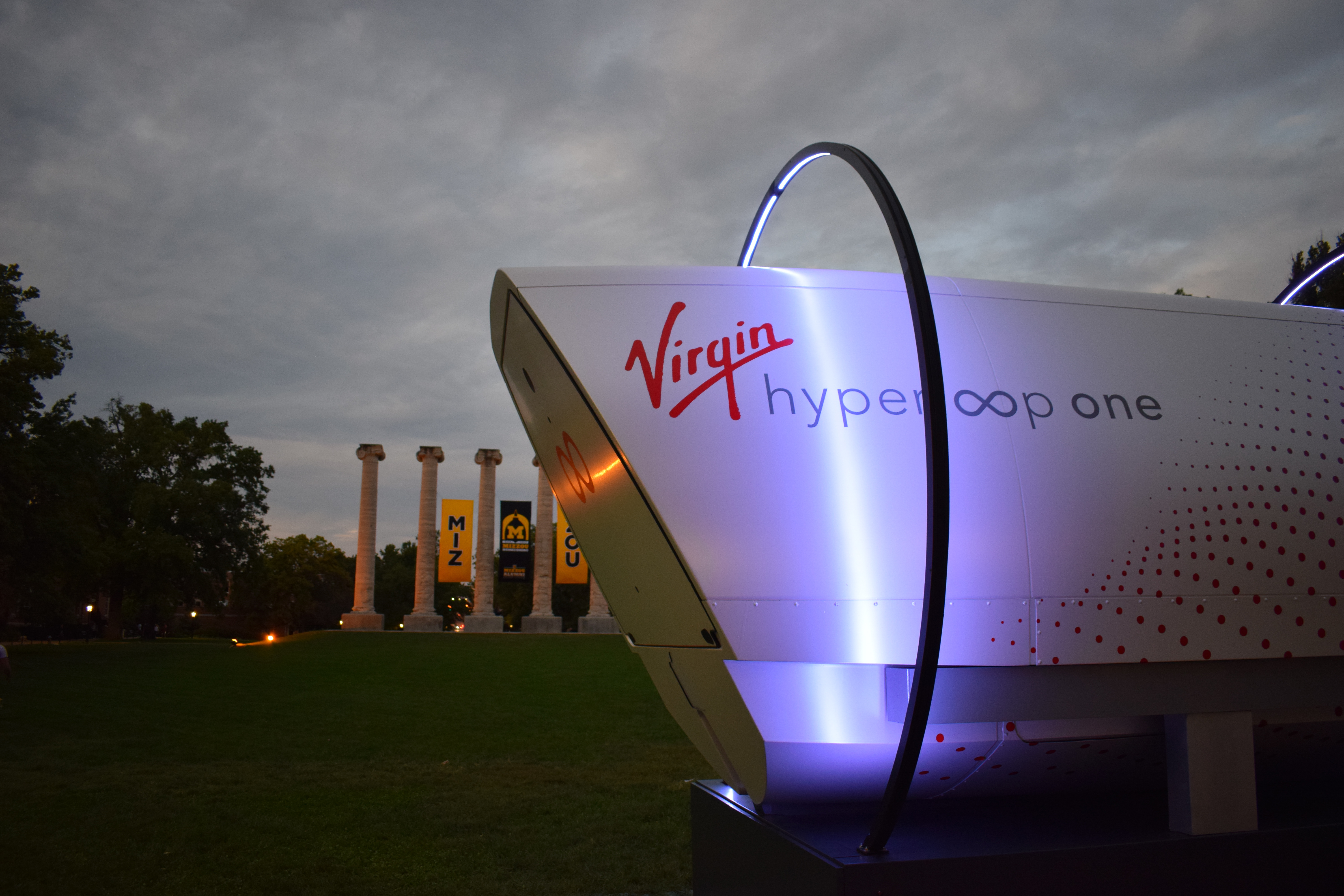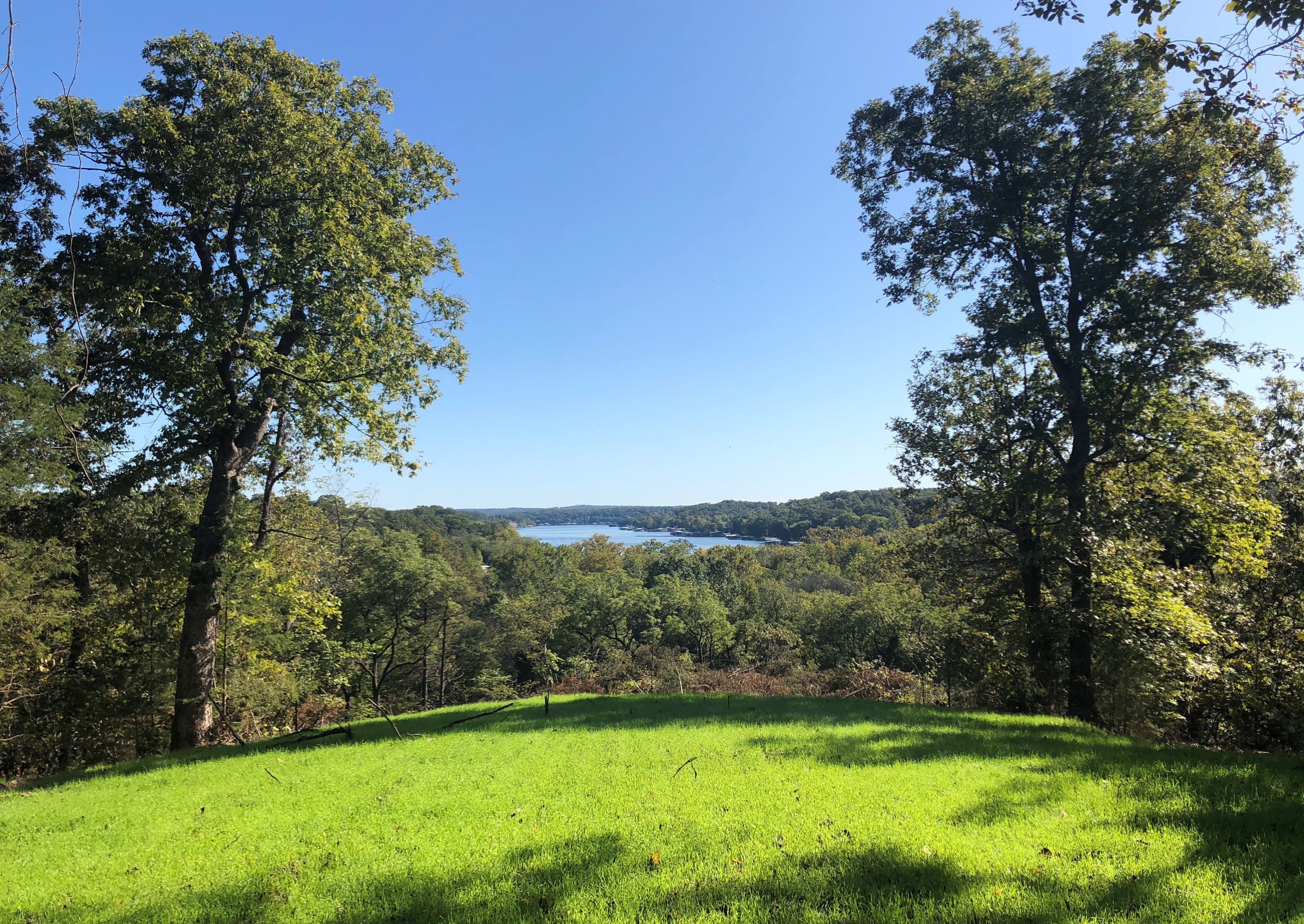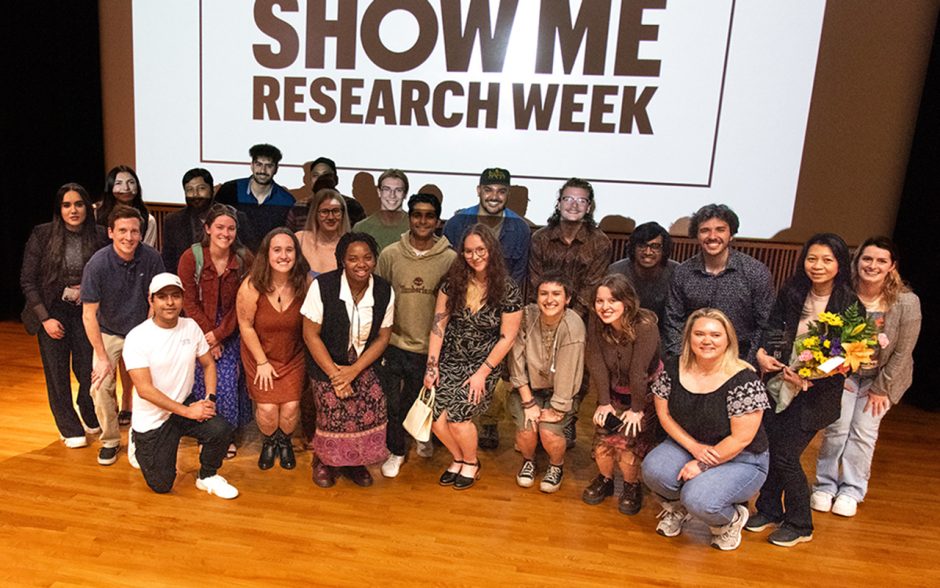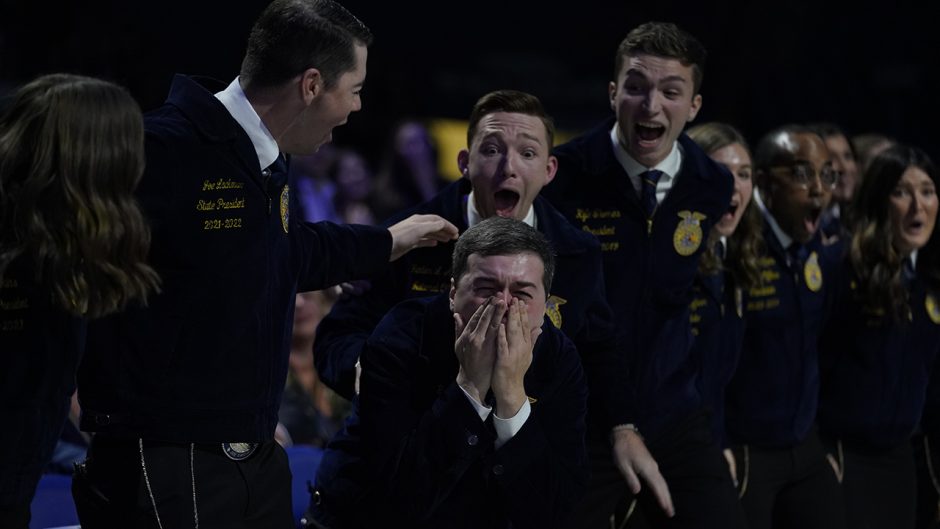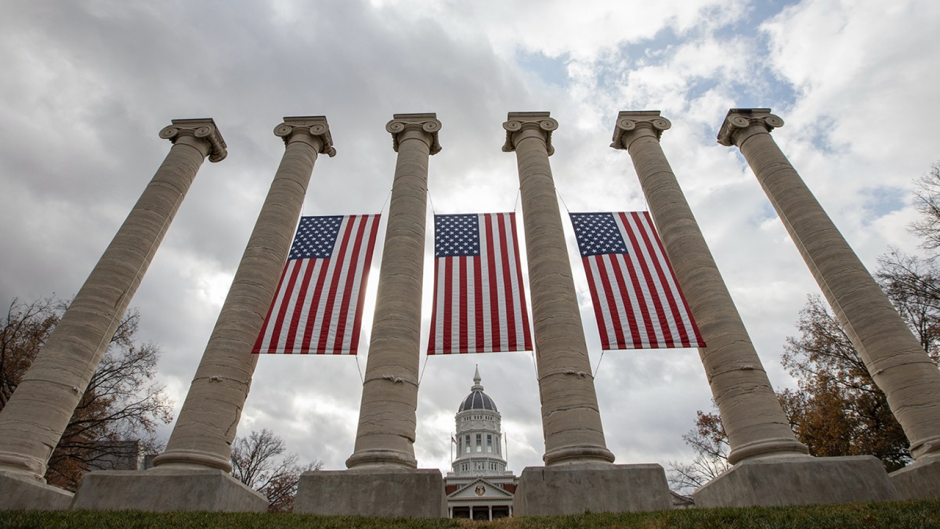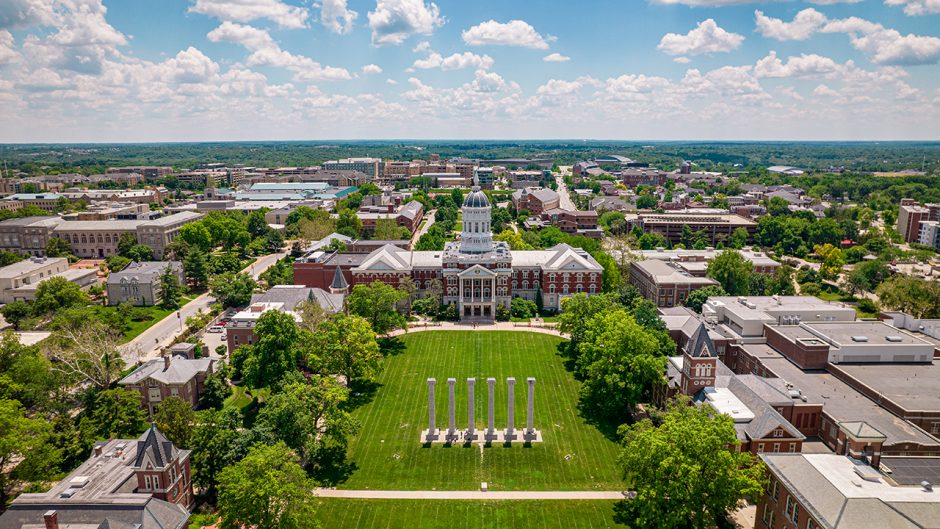1.University of Missouri celebrates launch of new health research center
In June, University of Missouri leaders and state and national officials broke ground on the NextGen Precision Health Institute, which will accelerate medical breakthroughs for patients in Missouri and beyond, increase collaboration among MU scientists and industry partners, attract research funding and generate jobs.
The Institute, which will harness and support research activities across the university and UM System, aims to translate fundamental research from laboratories to effective treatments and devices that can positively impact health and patient care.
The event also served as the official launch of the NextGen Precision Health Initiative, which will increase collaboration and support precision health research activities across the UM System.
2. A “Nobel” act of generosity
Last year, George P. Smith became the first Mizzou professor to receive a Nobel Prize. But Smith’s incredible contribution didn’t stop there. This year, Smith chose to donate the prize money to Mizzou and with his wife, Marjorie Sable, and established the Missouri Nobel Scholarship Fund. The fund supports undergraduate students in the College of Arts and Science. The 78-year-old Curators Distinguished Professor Emeritus of Biological Sciences was among a trio of researchers that the Royal Swedish Academy of Sciences awarded the 2018 Nobel Prize in chemistry. His achievement also represents the first Nobel Prize awarded within the University of Missouri System.
Smith’s generosity proves that at Mizzou, scholarship and teaching are driven by a commitment to public service and excellence.
3. The Tigers are BACK
Mizzou’s freshman class increased by more than 16%, marking the second year in a row the university has experienced double-digit percentage freshman enrollment growth. Transfer enrollment increased by 15% overall, with a 21% increase in students transferring from community colleges.
Overall enrollment at Mizzou increased approximately 1%, with a total of 30,046 students.
Official numbers also confirmed that 87.9% of freshmen from last year returned to Mizzou as sophomores — the highest retention on record.
“Enrollment increases are not an accident,” MU Chancellor Alexander N. Cartwright said. “Students are choosing to come to Mizzou for all that this premier university has to offer — innovative research, exemplary academics and an unparalleled campus experience.”
4. A constitutional gift
As a result of four years of success, Mizzou received a $10 million gift from the Kinder Foundation to support new degree opportunities for undergraduate and graduate students at the Kinder Institute on Constitutional Democracy and the College of Arts and Science.
The degrees will sustain and expand the Kinder Institute’s partnership with the University of Oxford through study abroad and research opportunities.
In 2015, a $25 million gift from the Kinder Foundation established the Kinder Institute on Constitutional Democracy. Rich Kinder, a native of Cape Girardeau, Missouri, earned his bachelor’s and law degrees from MU.
5. New head coach and south end zone facility round out year for Tiger football
In December, Eli Drinkwitz was named the new head coach for Mizzou football. Drinkwitz’s offensive acumen has been a key element in his teams winning five conference championships while compiling a perfect 8-0 bowl game record in 10 seasons at the Football Bowl Subdivision level.
“I can’t wait for every Tiger to meet Eli, he’s a special guy who has a magnetic personality that people will appreciate and enjoy,” said Mizzou Director of Athletics Jim Sterk. “I’m thrilled to have him here at Mizzou leading our program. He’s got passion, a plan and a vision that will take this program to great heights.”
Drinkwitz will be at the helm with the new $98 million south end zone facility, which opened earlier this year. The state-of-the-art facility has nearly 200,000-square feet and includes premium seating opportunities and game-day enhancements for Tiger fans. The football operations area includes team and staff locker rooms, an enhanced sports medicine facility, a weight room, nutrition area and equipment room as well meeting rooms and coaches offices.
For fans, there are 16 suites, a 750-person field-level club, a 1,254-seat indoor club area and general seating for about 1,300 fans. A full kitchen serves the premium areas, and there are new video boards, additional restrooms and concessions.
6. Three MU faculty named 2019 fellows of the American Association for the Advancement of Science
Reproductive biology. Neuroscience. Microscopic organism processes and toxicology. The contributions to these three scientific fields have earned three faculty members at the University of Missouri the distinction of 2019 Fellows of the American Association for the Advancement of Science (AAAS). They are:
- Zhiqiang Hu, a professor and former chair of the Department of Civil and Environmental Engineering in the College of Engineering
- David Schulz, a professor of biological sciences in the College of Arts and Science
- Peter Sutovsky, a professor of animal sciences in the College of Agriculture, Food and Natural Resources, with a secondary appointment in the School of Medicine
7. Hyperloop could be a reality in Missouri one day
Imagine traveling over 600 miles an hour between St. Louis and Kansas City, making the trip only 30 minutes instead of a nearly four-hour car ride. Sound like science fiction? Not quite. Missouri’s Special Blue Ribbon Panel on Hyperloop, a group of public and private leaders tasked with providing recommendations on how to make hyperloop a reality in Missouri, released its final report in October. The panel recommended that the University of Missouri System take the lead in gathering a consortium to form the International Tube Transport Center of Excellence. Mizzou’s mmengineering researchers would join that effort.
8. Visionary support
Before Homecoming weekend, Jim Fitterling, a 1983 MU graduate and CEO of Dow, announced a $6 million gift for the NextGen Precision Health Institute.
Fitterling began working for Dow two weeks after his graduation. He has held many leadership positions within the company’s various business units. Additionally, he has been at the forefront of the company’s inclusion, diversity, health, safety, research and sustainability initiatives.
“It is an honor to give back to the university that has given me so much,” Fitterling said. “Knowing that the University of Missouri will be transforming health care also makes me very proud to be a Tiger.”

Dean of Engineering and Vice Chancellor for Strategic Partnerships Elizabeth Loboa and Chancellor Alexander N. Cartwright celebrated a $6 million gift from alumnus Jim Fitterling, center, for the NextGen Precision Health Institute.
9. Duan named National Academy of Inventors fellow
The National Academy of Inventors (NAI) named Dongsheng Duan, MU School of Medicine’s Margaret Proctor Mulligan professor in medical research, to its 2019 Fellows Program. Duan specializes in gene therapy, virology, neuromuscular biology and molecular therapies and holds 18 U.A. patents and has an additional five pending.
“I’m honored to be elected as a fellow,” Duan said. “I owe a lot to the people I have the privilege to work with, including my mentors, collaborators and most importantly my colleagues in the lab. I will continue to pursue my research in Duchenne muscular dystrophy and gene therapy, hopefully making more findings that can be translated to patients to improve their quality of life.”
The 2019 Fellow class represents 136 research universities and governmental and nonprofit research institutes worldwide. The class collectively holds over 3,500 issued U.S. patents.
10. Prehistoric AC
Tyrannosaurus rex, one of the largest meat-eating dinosaurs on the planet, had an air conditioner in its head, says Casey Holliday, a professor of anatomy in the School of Medicine. Holliday collaborated with researchers at the University of Florida and Ohio University to use thermal imaging — devices that translate heat into visible light — to examine alligator skulls in Florida. The imaging showed alligators — whose body heat depends on the environment — use similar holes in their skulls to regulate their body temperature. The team believes this evidence overturns hypotheses about the anatomy of a T. rex’s skull.
11. Land of the Osage Research Center celebrates grand opening
In October, the MU College of Agriculture, Food and Natural Resources celebrated the grand opening of the new Land of the Osages Research Center in Gravois Mills, a village near the Lake of the Ozarks. The center will further research in agroforestry, the integration of trees and shrubs into crop and animal farming systems to increase biodiversity and reduce erosion.
The 500-plus acres of farmland that make up the center were an estate gift from Doug Allen, who established MU’s H.E. Garrett Endowed Chair Professorship in 2006 and passed away in 2017. The center partnered with the Osage Nation, a Midwestern Native American tribe of the Great Plains, and future plans for the center include demonstration trails, internship opportunities and ecological workshops.
12. Mizzou continues commitment to veterans and their families
This year, Mizzou launched several programs and projects to improve the lives of our military veteran students, faculty, staff and their families. The new Mizzou Veterans Wellness Center – housed in the MU School of Law Veterans Clinic – is a partnership between the MU Veterans Clinic and the Harry S. Truman Memorial Veterans’ Hospital. The collaboration is designed to make accessing health resources easier for veterans and their families.
Other highlights:
- MU was named by College Factual as one of the best universities for veterans.
- The MU Veterans Center, located in Memorial Union, was expanded to include space for student veterans to socialize, study and connect with resources as they transition from the military to academia.
- MU was designated as a Purple Heart University in recognition of the university’s support of military members, including veterans and their families.
13. MU partners with state community colleges
A growing segment of students got a boost in early October with a commitment between University of Missouri leaders and the state’s community colleges to ease the transition to Mizzou. The agreement offers students who have met certain requirements guaranteed admission to Mizzou. Chancellor Alexander N. Cartwright, who attended community college prior to transferring and receiving his bachelor’s and doctoral degrees from the University of Iowa, said supporting transfer students reflects MU’s commitment as a land-grant university to support the success of all students. Among the over 30,000 students taking classes at the University of Missouri, 1,192 are new students who transferred to Mizzou from other institutions — a 15% increase from fall 2018.
14. New changes strengthen Greek community
Following nearly two years of study and discussion, Mizzou enacted policy changes that strengthen the university’s fraternity and sorority life system and position MU as a national leader on Greek life. The changes include practices designed to support greater student success, safety and sustainability of Mizzou’s fraternities and sororities.
Also, the University of Missouri Police Department became the primary law enforcement response agency for Greek houses — which was among the recommendations of the advisory board.

Multicultural Greek Council President Daniel Gray, National Pan-Hellenic Council President Omobude Eke, Panhellenic Association President Shelby Haskins and Interfraternity Council President Matt Eblen at MU's historic columns.
15. Mizzou on the moon — 50th anniversary of moon landing shines spotlight on MU's ties to space
July 21, 2019, marked the 50th anniversary of humanity’s first steps on the moon, a feat of technological wizardry and audacity unparalleled in history at the time. MU’s Space Sciences Research Center was established in 1964, five years prior to the historic 1969 feat, and the center attracted some of the nation’s top scientists.
Linda Godwin, who received a master’s and doctorate in physics from Mizzou, became an astronaut at NASA just five years after joining the agency. She spent more than 38 days in space over the course of her career. Godwin eventually returned to Mizzou as a professor of physics and astronomy.
16. Outstanding faculty members honored with Kemper Award
Recipients of one of the university’s most prestigious awards this year were Botswana Blackburn, director of the Bachelor of Health Science Program and an associate teaching professor of health sciences in the School of Health Professions; Jennifer Fellabaum-Toson, associate teaching professor and chair of MU’s Department of Education Leadership and Policy Analysis; Donald G. Meyer, assistant teaching professor of marketing at the MU College of Business; Peter P. Motavalli, a professor of soil fertility and plant nutrition in the College of Agriculture, Food and Natural Resources; and Brian Silvey, associate professor of music education and director of bands at the MU’s School of Music.
This year marks the 29th anniversary of the Kemper Awards, which were established in 1991 with a $500,000 gift. William T. Kemper, a 1926 MU graduate, was a well-known civic leader in Kansas City until his death in 1989. His 52-year career in banking included top positions at banks in Missouri, Kansas and Oklahoma. Commerce Bank manages the trust fund.
17. Investments to Mizzou help researchers tackle grand challenges
In August, it was announced that Mizzou researchers would lead 12 new research projects with total funding of $10.6 million, which includes an investment from Mizzou and the UM System. The Mizzou projects were part of $20.5 million invested in 19 exciting research projects across the University of Missouri System.
The investments will help jump-start the university’s efforts to positively impact the lives of Missourians and people all over the world. Examples of the research being funded include developing reproductive therapies to solve fertility problems, understanding Missouri’s literacy needs, and making sense of Big Data.
Several of the investments will also help advance the NextGen Precision Health Initiative and Institute and lifesaving research in cancer, stroke, autism and other challenging conditions.
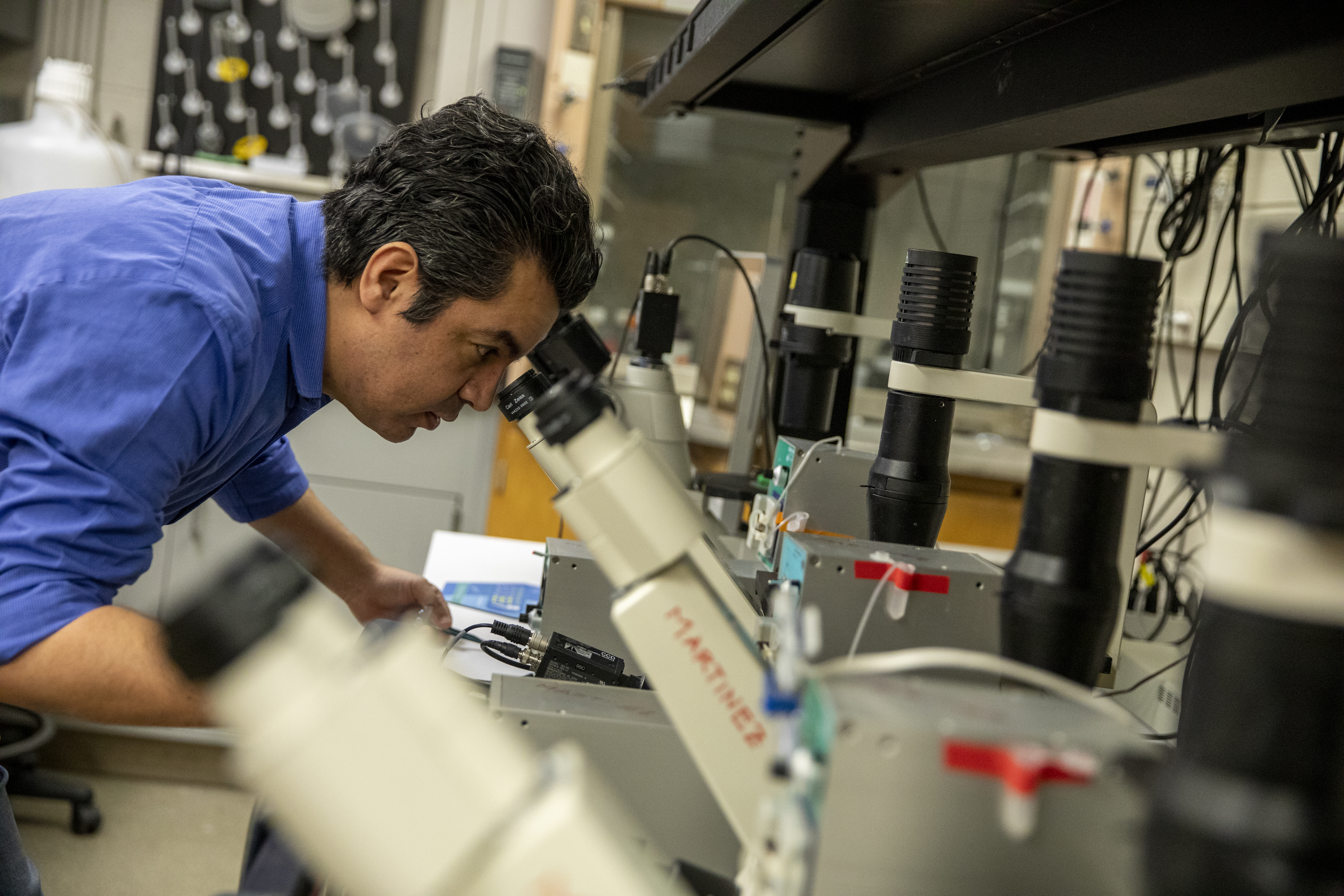
Doctoral student Francisco Ramirz-Perez, originally from Mexico City, Mexico, uses the Pressure Myography System at MU's Dalton Cardiovascular Research Center.
18. MU lends a helping hand
Mizzou stepped up this year when Mother Nature unleashed her fury with widespread floodwaters in Northwest Missouri and a devastating EF-3 tornado in Jefferson City.
In May, MU answered the call when hundreds of people were caught in the path of a tornado that ravaged 3 square miles of Missouri’s capitol city. MU offered temporary housing to university employees, students and their families as well as those connected to Lincoln University displaced by the storm. Hundreds of faculty, staff and students — including members of the Mizzou baseball team — volunteered to help with the cleanup while MU Health pledged up to $50,000 in financial support and first responders. Additionally, MU Police Department sent officers to help monitor traffic and secure the damaged area, and MU Extension offered assistance.
MU Extension also was among 18 agencies in late March that gathered in Rock Port, Missouri, to answer questions and help the more than 200 families affected by floodwaters in the area. Extension members talked with victims about how to clean and repair their homes once the floodwaters receded.
19. Campus as canvas
In September, several large-scale murals “popped up” on Mizzou’s campus. The Artist in Residence program was proposed by Chancellor Alexander N. Cartwright to bring established and emerging artists to MU to celebrate the arts and to cultivate creativity across disciplines.
Each of the art installations were trompe l’oeil murals, which create a visual illusion to “trick the eye” into perceiving a painted detail as a three-dimensional object. While the murals were temporary and removed in late September, the first Artist in Residence events will be held during the 2020 spring semester. The program, organized by the MU College of Arts and Science, also has established partnerships with the MU Center for Health Ethics, the State Historical Society of Missouri and the University Concert Series.
20. Special Olympics Missouri announces new partnership
In November, Special Olympics Missouri announced a major statewide partnership with the University of Missouri, MU Health Care and the University of Missouri System. The partnership was announced on the heels of news that Special Olympics Missouri will hold its State Summer Games in Columbia in 2020 after hosting the games in Springfield for the previous three years. The new relationship will allow Special Olympics Missouri to tap into the statewide reach of MU, MU Health Care and the UM System. MU Chancellor Alexander N. Cartwright said the partnership aligns with the university’s core values and would celebrate the achievements of all people, including those with intellectual disabilities.”
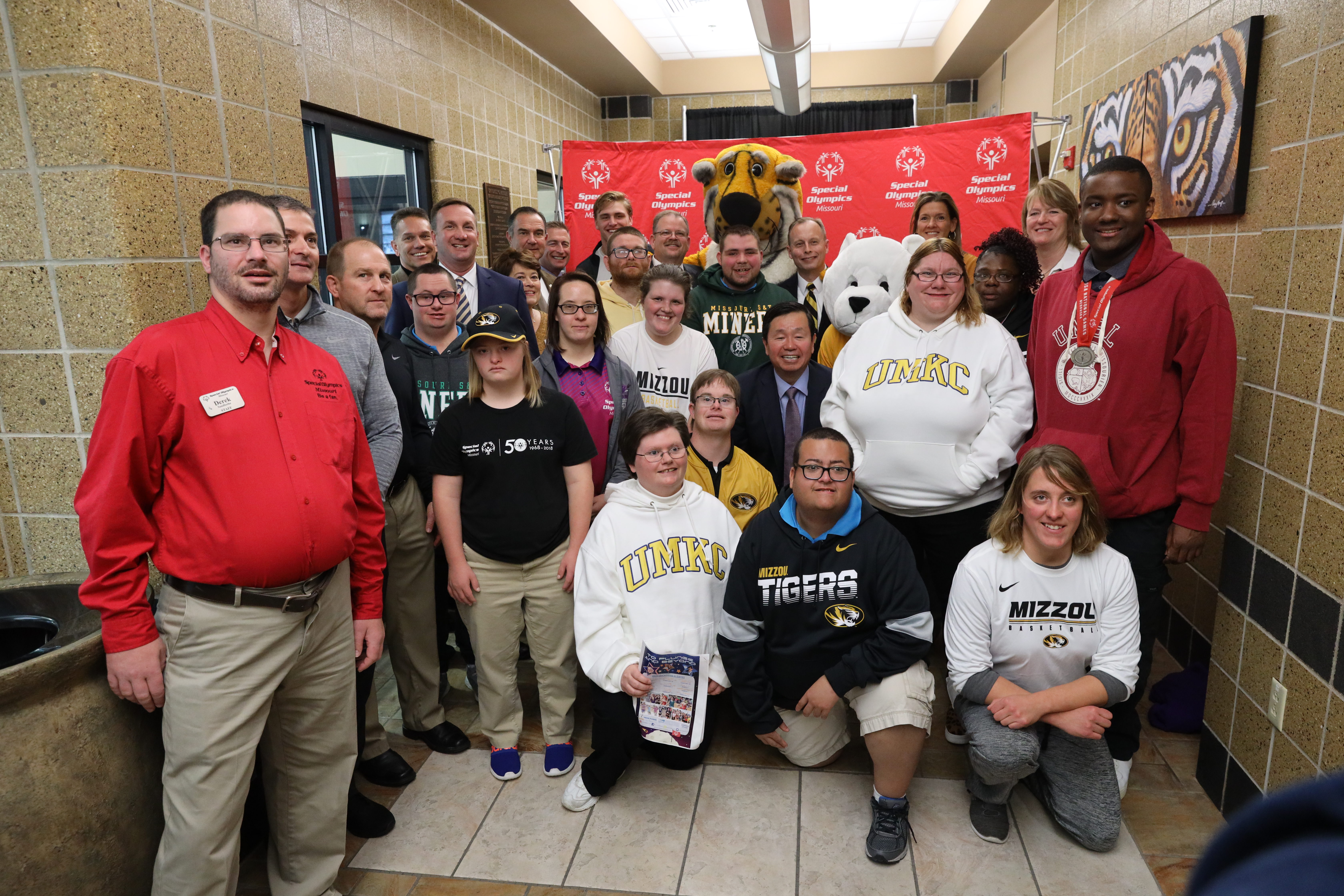
Special Olympics Missouri athletes were on hand at MizzouRec to celebrate the new partnership with Mizzou, UM System and MU Health Care.
21. It's back! Mizzou and Kansas renew border war
Jayhawks versus Tigers? Game on! After an eight-year hiatus, an announcement in October by the University of Missouri and the University of Kansas declared the once long-standing rivalry would resume on the basketball hardwood in 2020. Both schools agreed their men’s basketball programs would play one game against each other for six seasons beginning with the 2020-21 season — including two neutral site games in Kansas City. They have played 267 times against each other since their first meeting in 1907, and the Jayhawks hold the all-time series lead 172-95. They (officially) haven’t played a game together since February 25, 2012.


